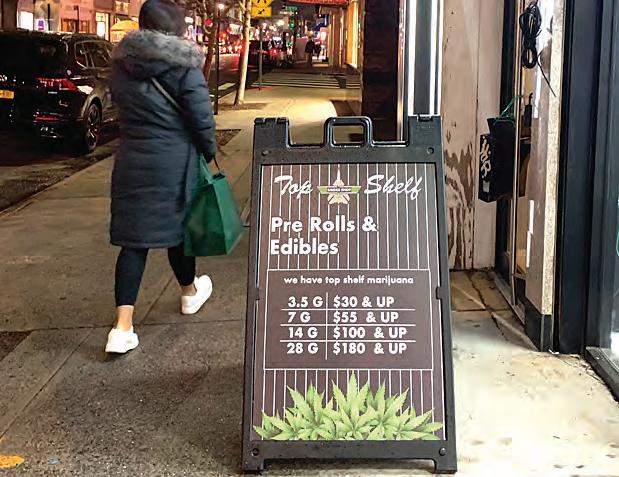
2 minute read
want illegal spots addressed State set to double cannabis licenses Queens to eventually get 32 but
by Deirdre Bardolf
Editor
The state will be doubling the number of marijuana dispensary licenses it is issuing to those affected by the prohibition of the substance, the Office of Cannabis Management announced last week.
For Queens, that means 32 of the Conditional Adult-Use Retail Dispensary licenses will be allocated to the existing pool of qualifying business applicants.
After receiving about 900 applications and issuing 66 provisional licenses so far, the office will eventually grant 300 in total instead of the planned 150, the OCM announced in a press release.
To qualify, applicants must have a conviction for a marijuana-related offense prior to March 2021 or have a parent, guardian, child, spouse or dependent with one in New York.
Applicants must also have experience owning and operating a qualifying business that has been profitable for at least two years.
Licenses are also going to nonprofits like Housing Works and Jamaica-based LIFE Camp.
“With this expansion, more entrepreneurs will be able to participate in the first wave of this industry, allowing them to capitalize on the growing demand for cannabis products,” said Tremaine Wright, chair of the Cannabis Control Board, in a statement last Thursday.
“As more businesses enter this market, the innovation and competition will increase, leading to better-quality experiences for consumers,” Wright continued.
The Cannabis Control Board adopts regulations for packaging, labeling, laboratory testing, marketing and advertising and in the meeting last week also approved regulations for doing so. It voted last year to revise the proposed regulations and offered a comment period for the public to weigh in, which garnered over 400 responses.
As of November, the board had issued only four CAURD licenses for Queens and none have opened yet. There are only three licensed dispensaries open so far, all in Manhattan.
The OCM did respond to a request for an updated number on the licenses approved in Queens or their locations.
Some area lawmakers want to see the issue of illegal shops selling weed handled before more legal licenses are distributed.
Illegal stores have been allowed to open with little oversight and now have a solid hold on the revenue the state was expecting, said state Sen. Joe Addabbo Jr. (D-Woodhaven), and the NYPD and New York City Sheriff’s Office are forced to play catch-up.
“They can’t implement the current law and now you want to increase dispensaries,” Addabbo said, adding that the rollout should be completed first before more licenses are added.
At the 102nd Precinct Community Council meeting on Tuesday, Assemblywoman Jenifer Rajkumar (D-Woodhaven) brought up the issue as well.
“Marijuana was legalized. I voted against that legalization. And right now, what we are seeing is the regulatory framework of govern- ment is not prepared to deal with this legalization,” Rajkumar said.
She was asked about kids getting laced gummies at bodegas near their schools.
“I come from a family of doctors,” she said. “My mom works in drug addiction. So all my life I’ve seen youth suffering, getting addicted to drugs. And this is exactly what I feared. I’ll do everything I can to increase the tools of enforcement and to set up a structure that makes sense.”
Next month, the OCM will make recommendations to the board on the majority of the remaining applications in the areas of the state not impacted by a courtordered injunction.
Through the CAURD program and the New York State Social Equity Cannabis Fund, licensees are provided “turn-key, renovated retail locations.” Last year, it was announced that licensees could pursue their own locations instead of going through the fund, which freed up resources to expand the number of licenses.
The move comes as communities continue fighting the increase in illegal pot shops popping up throughout the city, 225 of which are in Queens, the Chronicle has reported. A public safety briefing from city officials last month detailed efforts to crack down on shops. Q








